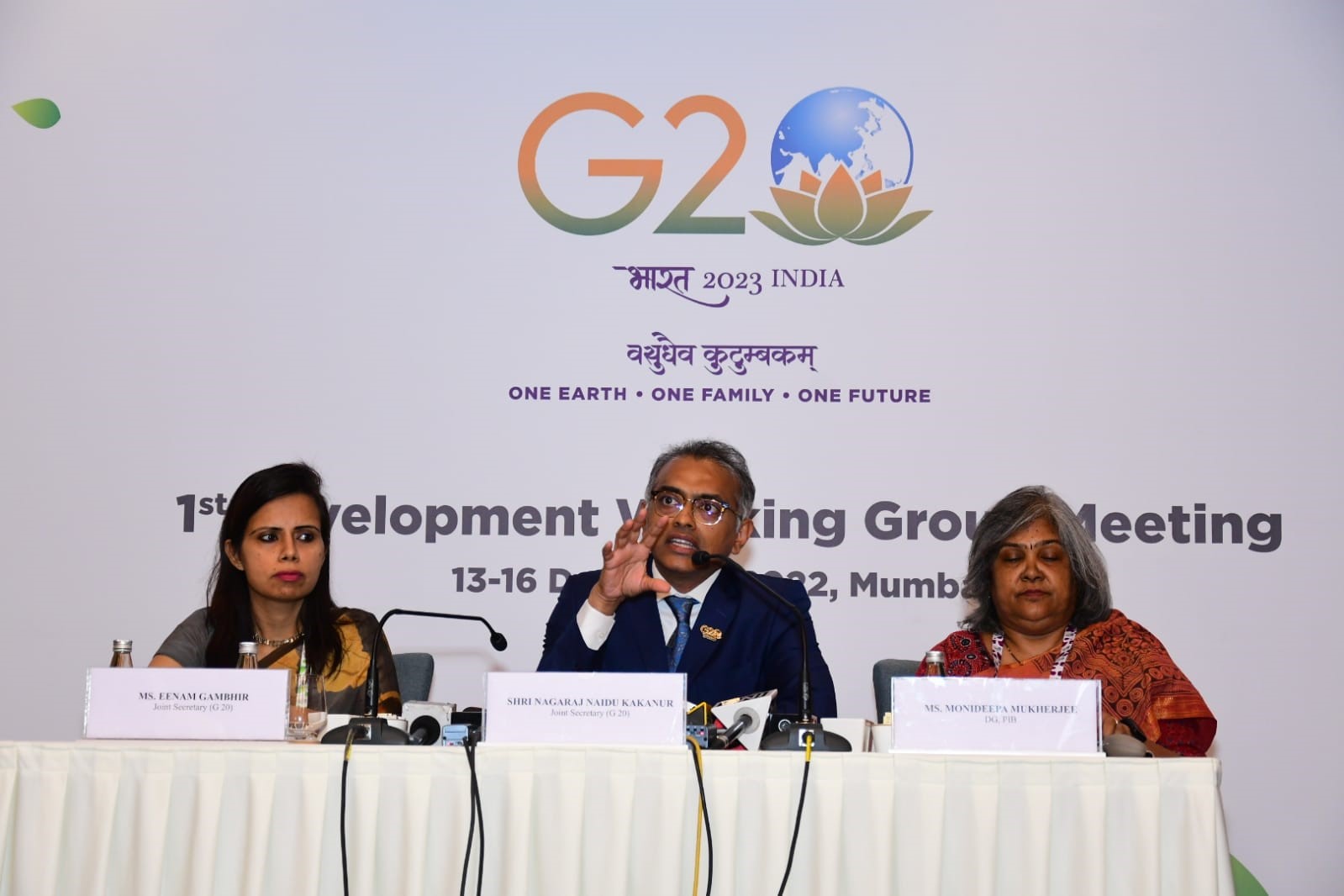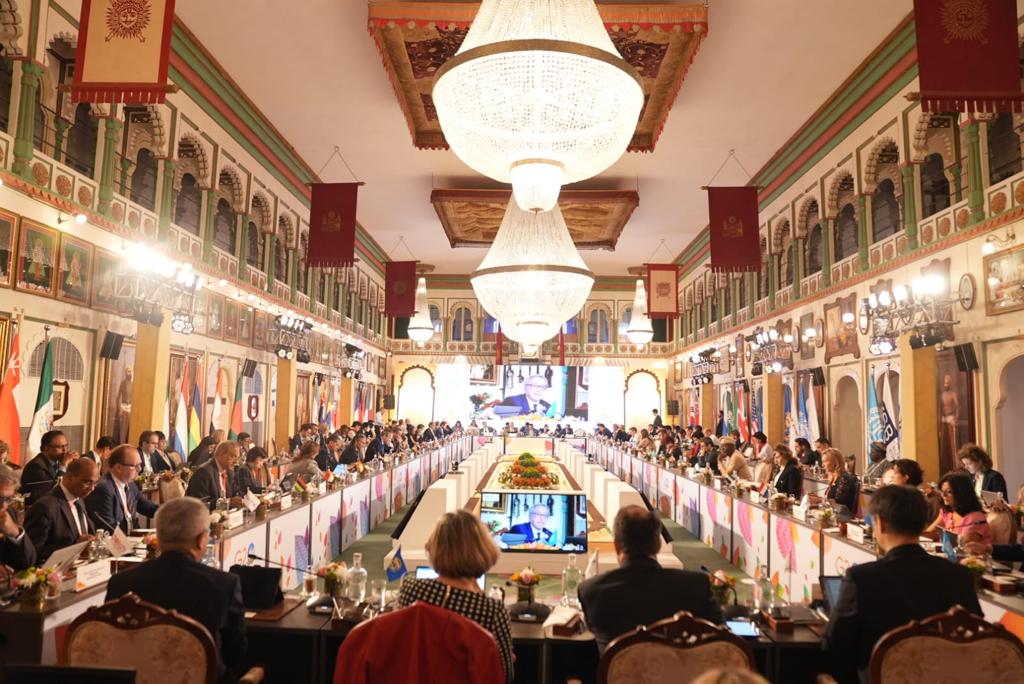
G20 under India’s presidency
 By Venkatesh Raghavan*
By Venkatesh Raghavan*
Mumbai: Before curtains were drawn on the preparatory work for the G20 summit to be held under India’s presidency in New Delhi in September 2023, G20 delegates from the Development Working Group provided detailed deliberations that listed commonly shared global areas of concern, in India’s financial hub, Mumbai, this week.
After the initial deliberations in Bengaluru, India’s silicon valley, the G20 delegates from the Development Working Group (DWG) held detailed discussions in Mumbai this week, on themes that related to harnessing data for development, mainstreaming lifestyle for the environment (LIFE) globally, accelerating priorities on Sustainable Development Goals (SDGs) besides digital transformation and a seamless transition to green technologies. The meeting was conducted under the aegis of the G20 Sherpa track.

The first G20 Sherpa meeting in Udaipur – a three-day affair between December 4 and 6, 2022, had substantive discussions on India’s G20 priorities on key global issues of inclusive growth, multilateralism, and women-led development, as well as 3Fs (Food, Fuel, and Fertilizer), tourism, and culture. Initiating the discussions there, Amitabh Kant, G20 Sherpa, provided an overview of India’s G20 priorities on these subjects, across six different Working Groups on Agriculture, Trade and Investment, Employment, Anti-Corruption, Tourism, and Culture, as well as ways to strengthen cooperative efforts therein. He emphasized the need for transformational efforts in agriculture, trade, employment, and combating corruption and economic crimes. During discussions on the global impediments to economic growth, delegates underscored the importance of attaining resilient growth through long-term solutions and meaningful partnerships.
In Mumbai, the first two sessions of the discussion focused on the acceleration of progress on the SDGs. Two global institutions, namely the Organization of Economic Co-operation and Development (OECD) and the International Labour Organization (ILO) made detailed presentations on the themes that included combating of gender discrimination and increased digitization of the economic process flow besides achieving green and clean technology that also included energy streams. There was also an emphasis on leveraging women-led development to attain SDGs that were listed. The discussions detailed ensuring the clearing of all bottlenecks that come in the way of access to sustainable finance and ensuring a fair degree of gender equality to enhance the quality of working life for women.
The third session focused on ushering in increasingly digital kind of economies under the aegis of the Digital Economy Working Group (DEWG) and witnessed delegates having an in-depth discussion on enhancing the quality of data and building data with trust. The discussions also emphasized increasing participation from the private sector and civil society towards attaining this goal besides making room for capacity building. The final session closed with a discussion on preparations that were to be made for the 2023 G20 summit at New Delhi after a brief conference on the integration of SDGs with local realities and knowledge base.
The Mumbai G20 delegates’ stay was punctuated with an exhibition of local Maharashtrian handicrafts including a pottery-making stall that was set up at the venue. The icing on the cake was an excursion to the Kanheri Caves in the Sanjay Gandhi National Park.
The earlier meeting that was hosted for conferencing among Finance and Central Bank deputies in the city of Bengaluru aimed at strengthening Multilateral Development Banks (MDBs), addressing global debt vulnerabilities, financing of action to counter climate change besides heading towards Sustainable Development Goals (SDGs) the member countries had set for their respective economies. Having assumed the presidency of the G20 from another member country, namely Indonesia, India the stage is set for shaping G20’s finance track.
From the India end, Deputy RBI Governor Dr Michael Patra and Economic Affairs Secretary, Ajay Seth co-chaired the G20 finance track meeting. Upward 160 delegates from across the world attended the seven discussion sessions spread over two days besides a couple of side events. Opinions were sought from the delegates for the finance track priorities cutting across varied work streams. An event was devoted to addressing the need for strengthening MDBs in order to surmount transboundary challenges faced by various geographic terrains in the member countries. The Central bankers too had an event to discuss challenges posed by climate change and financing of a green economy.
The agenda of this meeting was crafted keeping in view the vision given by India’s Prime Minister, Narendra Modi for Indian Presidency’s G20 theme with a focus on emerging with “One Earth, One Family, One Future” (translated from Vasuhaiva Kutumbakam). The theme also envisaged the building of resilient, inclusive and sustainable cities for the near future. Besides issues pertaining to global challenges that include inflation, impending food and energy shortages and the effect of climate change in different parts of the world were discussed at length in the inaugural session.
There was also a call for globally combating distress caused by debts, ensuring smooth capital flow and providing an effective safety net for the world economies. Here again, the theme of readying and financing cities to engender urban Indian infrastructure in the year ahead was discussed at length. The keynote was provided by the Infrastructure Working Group 2023. The global teams also shuttled for tax reforms as a key area of focus in 2023, voicing their support for the currently progressing work on the Two-Pillar Tax Package to be implemented within the G20 framework.
On the health front, a session was devoted towards strengthening the coordination agreement between the finance and health ministries of respective countries. The discussion centred on Pandemic Prevention Preparedness and Response (PPPR) to lend a better support system for countries that fall under the low-income category. Key regional organizations were also invited for participating in the discussions.
The financial sector and financial inclusion issues were taken up in the last session of the two-day meeting. The discussions focused on financial sector developments and approaches to advancing financial inclusion through a people-centric vision. Delegates also exchanged views on priorities for appropriate financial regulations and ensuring financial stability through a common approach.
Overall, the meeting saw broad support for the proposed priorities of India’s G20 Finance Track agenda for 2023. Further development of agenda items during the course of the Indian G20 Presidency will be enriched with the views presented by the Finance and Central Bank Deputies representing a wide range of perspectives.
The discussions are expected to set the stage for the first G20 Finance Ministers and Central Bank Governors meeting which will be held from February 23-25, 2023, in Bengaluru, Karnataka.
*Senior Journalist




